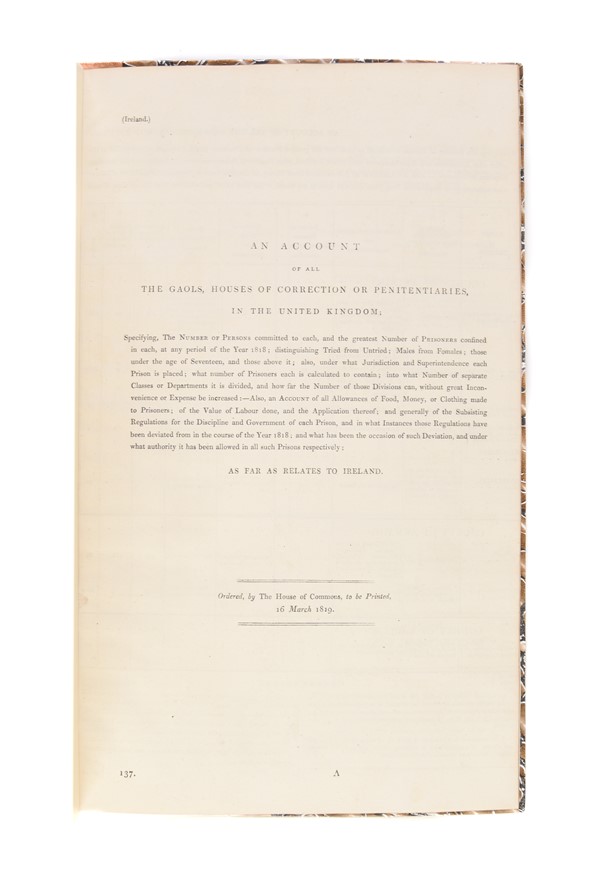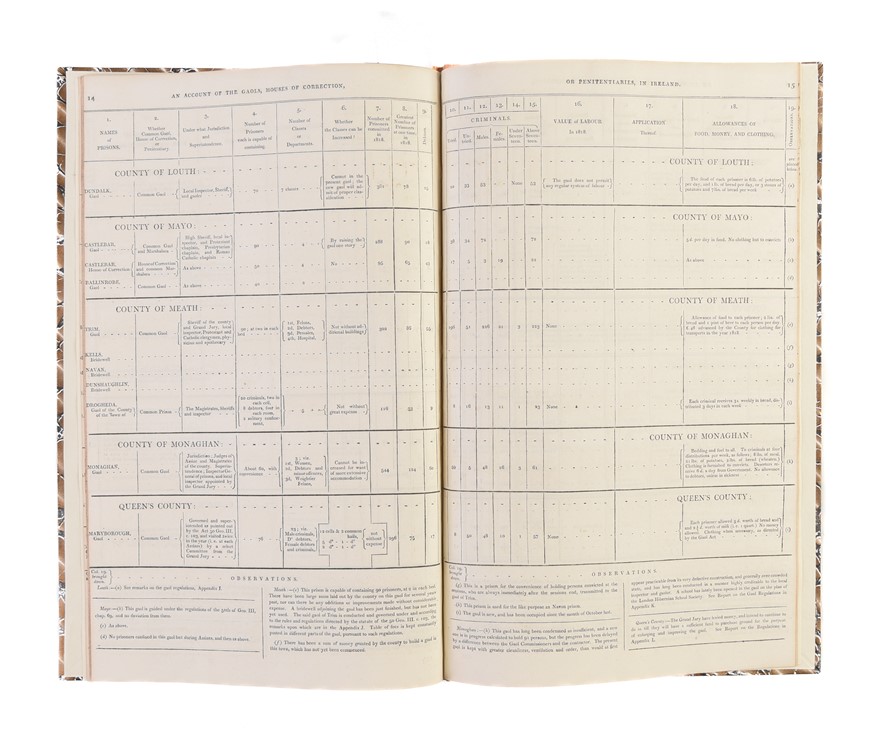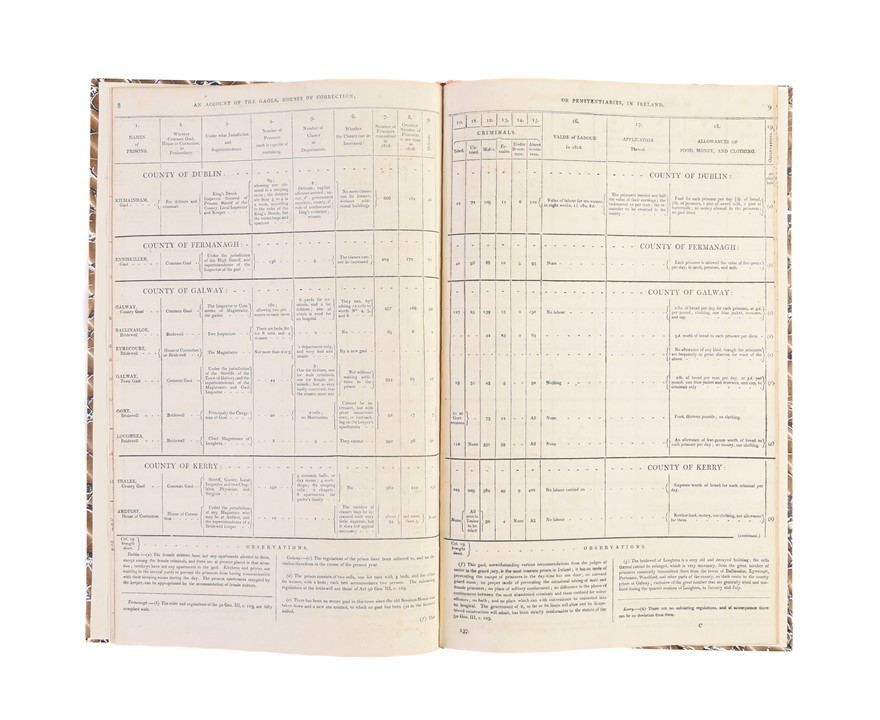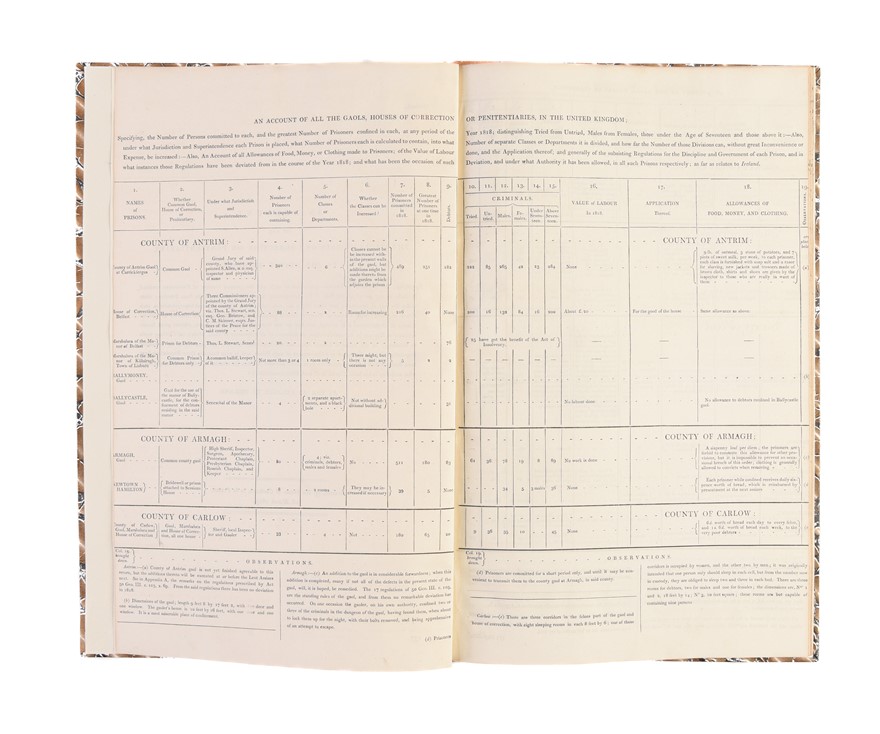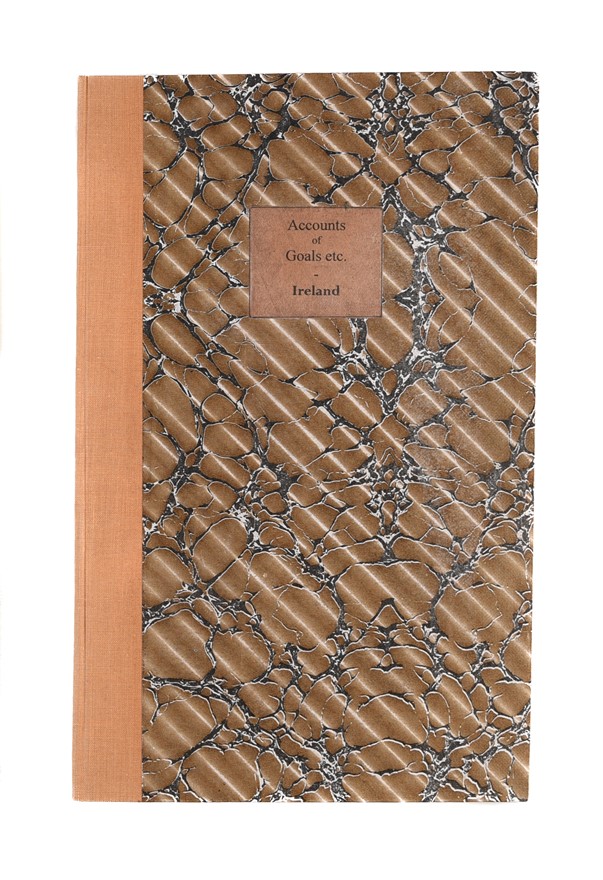An Account of all the Gaols, Houses of Correction or Penitentiaries, in the United Kingdom...as far as relates to Ireland.
PRISONS, IRELAND (1819.)
£950.00 [First Edition]
Please contact us in advance if you would like to view this book at our Curzon Street shop.
"A WRETCHED DUNGEON"
First Edition. Folio (330 x 194mm). 21pp., title-page followed by double-page tables arranged by county. Closely cropped at the fore-margin throughout touching a few letters of text but otherwise very clean. Modern cloth-backed marbled boards, label to the upper cover.
[London: ?Luke Hansard] Ordered, by the House of Commons to be Printed, 16th March
Rare. OCLC records copies at University of London, Cambridge and University of Amsterdam. The signatures begin at A and the pagination is separate.
A detailed and shocking account of all the prisons in Ireland at the beginning of the 19th century with information on the size, number and type of prisoners, labour undertaken by the prisoners and the allowances for food and clothing. The report highlights overcrowding, disease and the dilapidation of prisons in the period.
"The jail at Galway Town Court is described as, "the most insecure prison in Ireland", the report continues:
"...it has no mode of preventing escape of prisoners, in the day-time but one door; no outward guard room; no proper mode of preventing the occasional mixing of male and female prisoners; no place of solitary confinement; no difference in the places of confinement between the most abandoned criminals and those confined for minor offences; no bath; and no place which can with convenience be converted into an hospital..." (p.9).
The prison at Dungarvan (Waterford) is described starkly as, "a wretched dungeon, consisting of one apartment, where prisoners [around 14 in number] of both sexes are confined together, and neither bed or bedding allowed, unless provided by themselves"
The tables also give details of the provisions and clothing allocated to each prisoners, for example at the main Wexford prison:
"Each criminal, and the poorer description of debtors, are allowed half a quartern loaf and a pint of milk every day; several of the prisoners are allowed jacket, trousers and shirt, and sometimes shoes; the latter very seldom: all these supplied at the expense of the county. No allowance of money to any prisoner" (p.19).
At the main Londonderry jail prisoners are allocated:
"One quart of buttermilk to each person daily, together with a 7 1/2lbs of oatmeal, 21lbs. of potatoes, and half a pint of salt weekly to each. No clothing allowed, but bedding only: during the prevalence of the typhus fever, a jacket and trousers were provided by order of the Judge, to clothe such prisoners as came to be tried at the assizes, but the practice ceased with the disease" (p.13).
There are though signs of minimal success, the prison in Sligo is reported to have a school, opened in October 1818,
"...to employ the male prisoners, as no tradesmen were to be found among them; about 30 of them are now learning to read, write and cypher; the best conducted men of each class is appointed to superintend the cleanliness &c. of the department to which he belongs, and for which duty he is allowed a double portion of bread. The female prisoners receive constant employment from a few ladies who visit the prison" (p.16).
The living conditions at Carlow prison are described as such:
"There are three corridors in the felons part of the gaol and house of correction, with eight sleeping rooms in each 8 feet by 6; one of those corridors is occupied by women, and the other two by men; it was originally intended that one person only should sleep in each cell, but from the number now in custody, they are obliged to sleep two and three in each bed...." (p.3).
This report was part of a wide-scale investigation into the the state of prisons in England, Wales, Scotland and Ireland. Reports were commissioned in 1819 (as here) and also in 1823 and were the basis for the measures implicated under the Gaols Act of 1823 which was initiated by the Home Secretary, Robert Peel, and aimed to standardise conditions in prisons across the British Isles. It was also at this time that Elizabeth Fry began he own inspection of prisons concentrating on the welfare of female prisoners and created the Association for the Improvement of Female Prisoners. The tables here provide much information on the difficult (and dangerous) conditions for women in prison with many, for example, being forced to share cells with men.
Stock Code: 246336
